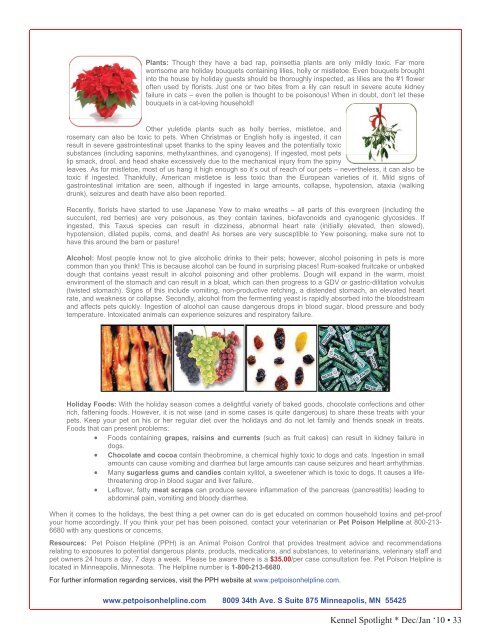Monark Puppies - Kennel Spotlight
Monark Puppies - Kennel Spotlight
Monark Puppies - Kennel Spotlight
Create successful ePaper yourself
Turn your PDF publications into a flip-book with our unique Google optimized e-Paper software.
Plants: Though they have a bad rap, poinsettia plants are only mildly toxic. Far more<br />
worrisome are holiday bouquets containing lilies, holly or mistletoe. Even bouquets brought<br />
into the house by holiday guests should be thoroughly inspected, as lilies are the #1 flower<br />
often used by florists. Just one or two bites from a lily can result in severe acute kidney<br />
failure in cats – even the pollen is thought to be poisonous! When in doubt, don’t let these<br />
bouquets in a cat-loving household!<br />
Other yuletide plants such as holly berries, mistletoe, and<br />
rosemary can also be toxic to pets. When Christmas or English holly is ingested, it can<br />
result in severe gastrointestinal upset thanks to the spiny leaves and the potentially toxic<br />
substances (including saponins, methylxanthines, and cyanogens). If ingested, most pets<br />
lip smack, drool, and head shake excessively due to the mechanical injury from the spiny<br />
leaves. As for mistletoe, most of us hang it high enough so it’s out of reach of our pets – nevertheless, it can also be<br />
toxic if ingested. Thankfully, American mistletoe is less toxic than the European varieties of it. Mild signs of<br />
gastrointestinal irritation are seen, although if ingested in large amounts, collapse, hypotension, ataxia (walking<br />
drunk), seizures and death have also been reported.<br />
Recently, florists have started to use Japanese Yew to make wreaths – all parts of this evergreen (including the<br />
succulent, red berries) are very poisonous, as they contain taxines, biofavonoids and cyanogenic glycosides. If<br />
ingested, this Taxus species can result in dizziness, abnormal heart rate (initially elevated, then slowed),<br />
hypotension, dilated pupils, coma, and death! As horses are very susceptible to Yew poisoning, make sure not to<br />
have this around the barn or pasture!<br />
Alcohol: Most people know not to give alcoholic drinks to their pets; however, alcohol poisoning in pets is more<br />
common than you think! This is because alcohol can be found in surprising places! Rum-soaked fruitcake or unbaked<br />
dough that contains yeast result in alcohol poisoning and other problems. Dough will expand in the warm, moist<br />
environment of the stomach and can result in a bloat, which can then progress to a GDV or gastric-dilitation volvulus<br />
(twisted stomach). Signs of this include vomiting, non-productive retching, a distended stomach, an elevated heart<br />
rate, and weakness or collapse. Secondly, alcohol from the fermenting yeast is rapidly absorbed into the bloodstream<br />
and affects pets quickly. Ingestion of alcohol can cause dangerous drops in blood sugar, blood pressure and body<br />
temperature. Intoxicated animals can experience seizures and respiratory failure.<br />
Holiday Foods: With the holiday season comes a delightful variety of baked goods, chocolate confections and other<br />
rich, fattening foods. However, it is not wise (and in some cases is quite dangerous) to share these treats with your<br />
pets. Keep your pet on his or her regular diet over the holidays and do not let family and friends sneak in treats.<br />
Foods that can present problems:<br />
Foods containing grapes, raisins and currents (such as fruit cakes) can result in kidney failure in<br />
dogs.<br />
Chocolate and cocoa contain theobromine, a chemical highly toxic to dogs and cats. Ingestion in small<br />
amounts can cause vomiting and diarrhea but large amounts can cause seizures and heart arrhythmias.<br />
Many sugarless gums and candies contain xylitol, a sweetener which is toxic to dogs. It causes a lifethreatening<br />
drop in blood sugar and liver failure.<br />
Leftover, fatty meat scraps can produce severe inflammation of the pancreas (pancreatitis) leading to<br />
abdominal pain, vomiting and bloody diarrhea.<br />
When it comes to the holidays, the best thing a pet owner can do is get educated on common household toxins and pet-proof<br />
your home accordingly. If you think your pet has been poisoned, contact your veterinarian or Pet Poison Helpline at 800-213-<br />
6680 with any questions or concerns.<br />
Resources: Pet Poison Helpline (PPH) is an Animal Poison Control that provides treatment advice and recommendations<br />
relating to exposures to potential dangerous plants, products, medications, and substances, to veterinarians, veterinary staff and<br />
pet owners 24 hours a day, 7 days a week. Please be aware there is a $35.00/per case consultation fee. Pet Poison Helpline is<br />
located in Minneapolis, Minnesota. The Helpline number is 1-800-213-6680.<br />
For further information regarding services, visit the PPH website at www.petpoisonhelpline.com.<br />
www.petpoisonhelpline.com 8009 34th Ave. S Suite 875 Minneapolis, MN 55425<br />
<strong>Kennel</strong> <strong>Spotlight</strong> * Dec/Jan ‘10 • 33









